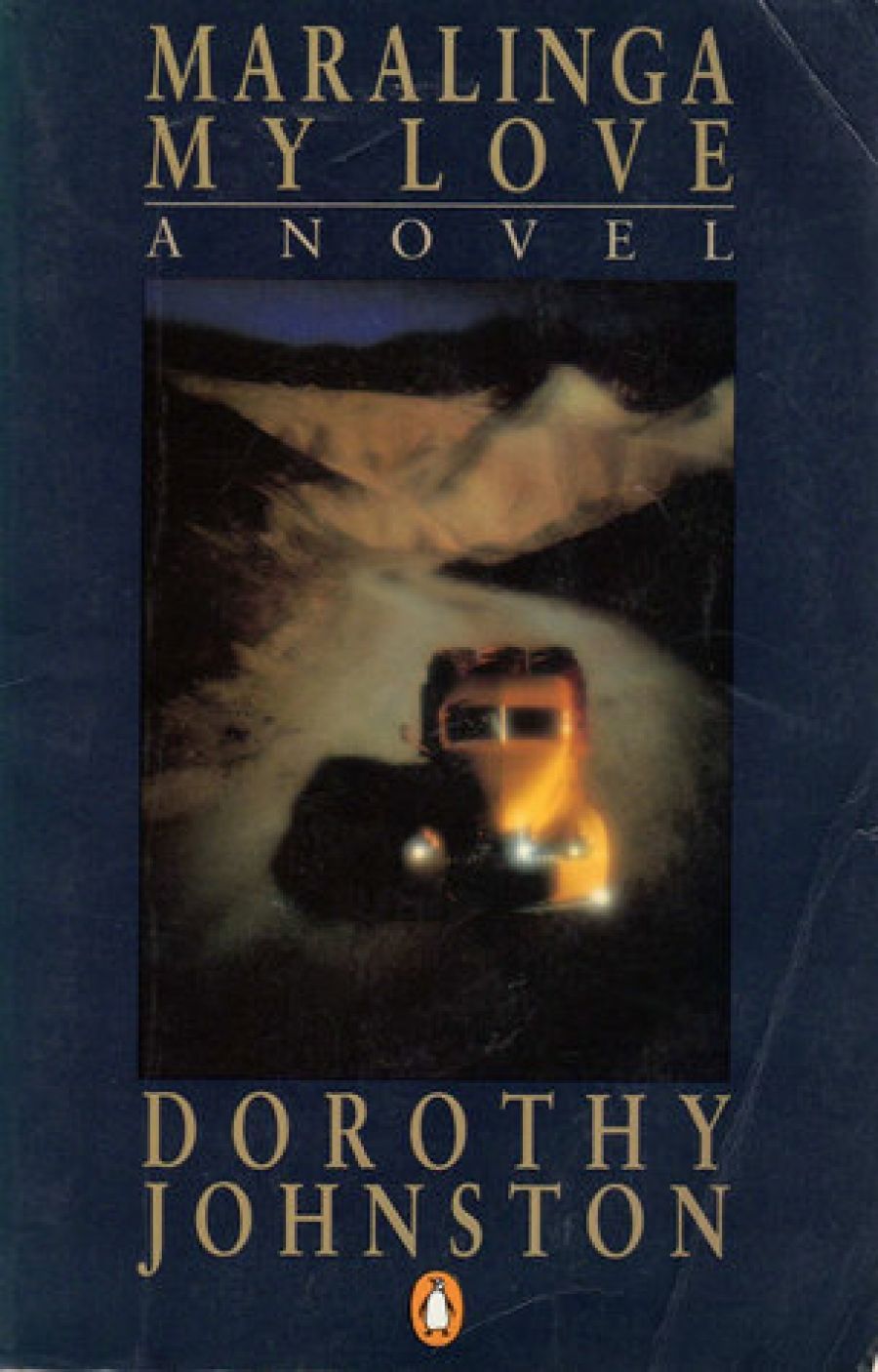
- Free Article: No
- Contents Category: Fiction
- Review Article: Yes
- Online Only: No
- Custom Highlight Text:
Among the stories by seven women writers in the recent collections, Canberra Tales, there is a haunting story by Dorothy Johnston, in which, in the improbable setting of contemporary Canberra, she conjures up the figure of a mythical boatman rowing across the waters of Lake Burley Griffin. The image lingers, shimmering and numinous.
- Book 1 Title: Maralinga, My Love
- Book 1 Biblio: McPhee Gribble/Penguin, 264 pp, $12.99 pb
That same sense of the mythic in the landscape is much to do with the appeal of Dorothy Johnston’s new novel, Maralinga, My Love. With an eerie, importunate beauty, the main character in the novel is Maralinga itself, a haunting twentieth century wasteland superimposed on the face of an ancient landscape. While Johnston explores Maralinga as a place of testimony, bearing witness to the dark face of this century and testifying to an eerie Australian folly, Maralinga exists first as a place of sinister beauty, a numinous landscape with a subtle claim on the imagination.
As Johnston reconstructs the history of the Maralinga atomic tests in the 1950s, the novel turns on the vast irony of its historical truth, the kind of story which ought to be fiction but which is essentially all too true. The sober realism of the novel is well suited to the preposterous truth of Maralinga.
But there is a chill to this novel, the chill of persistence: an old national folly which still we perpetrate. Johnston depicts a nation playing accomplice to Britain in the Maralinga tests and observing the silence of complicity. A British script, with Australia still cast as colony and dumping ground, and Australia not only assenting to the role, but abetting. The irony is of course that, in a different script, we still play the willing accomplice.
At the start, the scenes of the construction of the bomb towers and the establishment of the village have a strange air of anticipation, like ‘a carnival in preparation’, an irony Johnston exploits. The monstrous implications of the atomic bomb hover over scenes of mundane day to day preparations for the tests. The disjunction between the two bring a bizarre quality to the whole, a scanning of the reaches of collective folly, through a close mapping of its daily dumb prosecution. The novel is crisp and assured, sometimes gripping, told through the life of Graham Falconer, a young soldier who has his twenty-first birthday at Maralinga. Graham and an Australian scientist, Charlie Hamilton, are the central characters, linked through the years by ‘the memory of the second’s blinding whiteness seen through the backs of closed eyelids, through finger bones shaped like the claws of a bird’. The vision and the memory become a matter of investigation, discovery, anger and resolve, as together they uncover some of the secrets of Maralinga.
Within the limits of the British ‘health physics’ program, there are scenes of men cooking steaks on coals in a contaminated area, and of a primitive attempt to decontaminate an Aboriginal family present by accident on the Marcoo test site. In an accident, Graham himself and his friend Driscoll are contaminated. From numerous scenes of accident and contingency, all hidden within tight security and secrecy, there emerges an image of man blundering around the universe in awesome ignorance. And of Australia, collusive, complicitous in a self-betrayal reaching unimaginably far into the future.
Through the scattering of cobalt pellets, Graham discovers high levels of contamination far from the firing site and realises no one can admit the extent of contamination without admitting the cause, and thus the breach of the Geneva moratorium. Later, in Canberra, when Graham is working with the Defence Department, he resolves to break through all the secrecy surrounding Maralinga. Morally unswerving, Graham is perplexed by Charlie Hamilton’s retreat from the whole affair. That too has an insidious cause.
In time, Graham’s resolve focuses on Hugh McGovern, the two, marksman and marked. McGovern is the face of the Menzies era and an intriguing character, powerful, blandly manipulative, exercising his power almost lazily, but a character built on certainty and unable to conceive of any distinction between the interests of England and of Australia. In McGovern, we see the dangers of certainty, as the novel runs through to the Vietnam years.
As Johnston explores some of the devious forms loyalty can take, loyalties national and private, sly and perverse, there is the constant loyalty to place. Maralinga, My Love of course summons up images of the Duras script of the 1959 Resnais film, Hiroshima Mon Amour. This classic film impinges on the novel as Johnston explores the presence of Maralinga in the marriage of Graham and Deborah, with Maralinga Deborah’s constant rival through the decades, a fidelity changing the shape of their lives.
Ever summoning and importunate, Maralinga is for Graham the focus of complex loyalties: to truth, to the landscape of memory and his own past and, at the same time, aesthetic, a loyalty to contour, light, heat, and the vast treeless amphitheatre of the Taranaki site. Graham is lured back to Maralinga again and again, as if his real life is there acted out, as if that wasteland has made a perpetual territorial claim on him.
I have not read Johnston’s two earlier novels, Ruth and Tunnel Vision, but I will after reading Maralinga, My Love. It is not a great novel, but it is quietly assured and memorable for its evocation of Maralinga’s sinister beauty. It is also an important retrieval of recent history. Johnston is content for the story of Maralinga to carry its own impact, but she suggests the tests carried out there were not only atomic. Other kinds of national tests of Australia were carried out too and the consequences of those tests too are scattered across our collective consciousness as surely as the cobalt pellets across Maralinga.


Comments powered by CComment